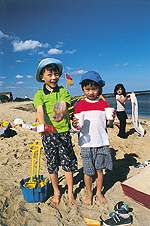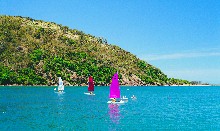|
Australia is home to people of many cultures, the majority of whom live on or near the coast. In June 1999 there were 18,966800 resident Australians of which 2,423500 were born in Europe and the former USSR, 558100 in South-East Asia, 460900 in Oceania, 304000 in North East Asia, 224100 in the Middle East and North Africa, 187000 in Southern Asia, 139600 in Africa, 101800 in Northern America, and 83100 in Southern America, Central America and the Caribbean.
Some Australians have chosen careers associated with the ocean, thus much of their life is directly influenced by the ocean through their work. These people include marine biologists, oceanographers (chemical, geological, systems, physical and satellite), marine meteorologists, ships scientists, coastal geomorphologists, commercial fishermen, lighthouse keepers, tour operators, captain/crew of shipping operations, military personal from various sectors of the defence force, life savers and personal from various marine fisheries/conservation organisations.
|
Much of our sport and recreation is ocean orientated (surfing, boating, skiing, swimming, diving, exploring, travelling, whale watching and relaxing) and many of our artists, musicians and writers drawn on the ocean as a source of inspiration.
The ocean is important to our heritage. Sacred Aboriginal sites, the landfalls of early explorers, historic buildings and settlements, ship wrecks, lighthouses, surfing meccas (Bells Beach and Bondi Beach), events of international significance (Sydney to Hobart yacht race) and unique coral reefs (Great Barrier Reef, Ningaloo Reef) identify us as a Nation.
Economically, the ocean remains an important source of food and raw materials. Successful industries operating within the marine environment include commercial fisheries, aquiculture, offshore oil and gas, the design and construction of high speed aluminium ships and ferries, marine research, environmental management and tourism.
For example, in 1998-99, gross value of production for Australian fisheries and aquiculture was $2,039 million, and for 1999-00 it was estimated to be $2,421 million. In 1998-99, gross value of production for offshore Australian oil and gas was approximately $3,900 million, and for 1999-00 it was estimated to be $9,900 million. |

Everyone likes the sea |
| |
|
|
Australian's are passionate about the ocean and recognise the importance of planning and management to ensure it remains healthy and productive. In 2000 there were more than 1,000 conservation/management organisations which had particular interests in marine issues. Australian has sovereign rights to explore, exploit, conserve and manage the naturMal resources within the area of our Exclusive Economic Zone.
Consequently, we have responsibilities in matters dealing with the maintenance of the Antarctic Treaty, fisheries, conservation of cetaceans, biodiversity, pollution, meteorology and shipping within this zone. Currently our government is committed to ‘protect areas of different marine ecosystem types', and to integrate future decision making across all marine sectors, specifically the fisheries, petroleum industry and conservation groups. |
 |
| |
Although Australia's marine areas are in reasonable condition in caparison with other counties, much needs to be done to keep our oceans healthy and productive. Coastal development, agriculture, fisheries by catch and introduced marine pests have already placed substantial pressure on our marine environment. The decline of southern blue fin tuna, orange roughy, gemfish and southern sharks through poor fishing practices illustrates the importance sound planning and management. By managing the way we use the ocean we can conserve our marine biodiversity and meet many of our social, cultural and economic objectives.
Start ..
|